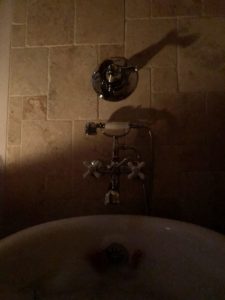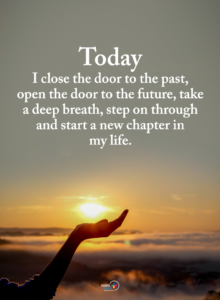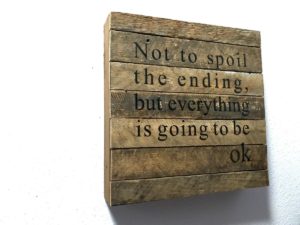The Last Word of the Story
I love a good soak in my bathtub. And a candlelit bath is even better. It’s an intentional act of self-care. Three evenings ago, I placed one of my newer candles on the toilet lid not far from the bath. I don’t think I’d yet placed this lit, lavender candle just so. As I reclined into my bubbly clawfoot tub, rather than relax, though, I defaulted and began to silently ruminate about some of life’s “troubles”—circumstances that have weighed me down so far in this new year, things that sometimes feel like just too much already, in 2020. A sense of “here we go, again,” an unconscious unwelcoming of what is.
I looked up and saw—at perfect eye level—an outstretched arm with an open hand.
My new lavender candle in its new position had cast a shadow from the faucet handle and onto the stone wall, creating an image that could not have been more clear, and neither could the message it sent:
“You. You in that tub. Here’s what you need to do. See the ‘writing’ on the wall? Do that. Open your hand.”
And then it was as if my entire lavender-bubble-engulfed body shifted, breathed a sigh of relief, and silently agreed.
I stared at the open hand.
Sometimes this open hand position is used in meditation and prayer.
Sometimes this open hand is outstretched in church, in praise and worship.
Sometimes, on the street, beggars use this open hand.
In all of the instances, the open hand signifies a readiness and willingness to receive.
And so was I, suddenly, easily. Fully present, warm, still, calm, soothed—and at peace.
No protestations. No default to old resistance. No stubborn will. No trying to control what is uncontrollable.
An open hand is acceptance.
Life is gentler when I loosen my grip and open my hand.
The next day I was mountain-biking, listening to an audiobook I had just downloaded the day before (the morning of my bath) and heard the following quote from Clara Clairborne Park:
“I write now what 15 years past I would still not have thought possible to write: that if today I were given the choice to accept the experience, with everything that it entails, or to refuse the bitter largesse, I would have to stretch out my hands—because out of it has come, for all of us, an unimagined life. And I will not change the last word of the story. It is still love.”
My attention, again, gotten. Heart gulp right there on my mountain bike. Full stop.
The day after that, on social media, my cousin (someone I adore and respect) posted a meme. It was an identical image of my outstretched arm/open hand from my wall. It too, had a caption of intentional acceptance, of openness, of receiving. It was another confirmation of my new, ongoing, “to do.”
Since my bath three nights ago, I’ve positioned the candle in the exact same spot, and I get the same open hand. I haven’t experimented yet, but I imagine a smaller candle or slightly different angle or position of the same candle wouldn’t create the same effect and give me that outstretched arm, open hand, which, clearly, I need.
It’s cause and effect. Different objects—different circumstances—cast a different shadow, or maybe no visible shadow at all. When life is less “shadowy,” and it is so because I think I’m in control, I’m oblivious to my need for my fingers to loosen their grip, to open my hand—in prayer, in worship, in praise, in begging. At the time, I don’t even know that I’m not doing those things, I don’t know what I’m missing. I’m disconnected.
The caption in my cousin’s social media meme read, “Today I close the door to the past, open the door to the future, take a deep breath, step on through, and start a new chapter in my life.”
Don’t discount the line because of the mixed metaphors. They work here.
Just trust.
To the right of my bathroom door, which I can see as I take a bath, and especially when I exit the bathroom, I see a sign that says, “Not to spoil the ending, but everything is going to be OK.”
Sometimes I look at it and—cynically— say to God, “yeah, but what’s OK? What’s OK for you might not be OK for me. No offense, but sometimes your definition of OK is a little screwy.”
And then, as if right on cue, I remember a dream I had several years ago. These were my notes that next morning:
“Went to sleep last night unaware of any worries, listening to waves. Had an epic, full-length-feature type of dream— a stressful, heart-wrenching plot and troubling subplots with the final scene in complete chaos, ending in destruction. Before the ‘credits’ rolled, I heard a voice calmly say, ‘Trust Me.’ At that instant, I had a full body/mind/soul understanding; I knew as never before that all worry is pointless, that He’s got it. And then I awoke.
Reflecting on the physical experience of that dream—many years ago—still always stops me in my wrongheaded, wayward foot and bike tracks.
And here’s where some more perfectly imperfect, beautiful, catawampus, mixed metaphors come in:
Not to ruin the ending, but here’s my humble opinion—take it or leave it. In all of the chapters in our respective stories, the only real power we have is that we get to decide if we live with white-knuckled fists, attempting to control the uncontrollable. Or we relax, we trust, we open our hands. We bathe in peace.
Tonight, I’ll likely need another reminder. So I’ll light the candle, adjusting it just so.
I’ll step into the bath.
I’ll stare at the open hand.
I’ll meditate, I’ll pray, I’ll worship, I’ll praise, and most likely, I’ll beg.
As I exit the bathroom, I’ll see the sign, I’ll decide to trust that I’ll be OK knowing that the end of the story—my unimagined life—is “ruined” in the best possible way, by believing that the last word is love.


